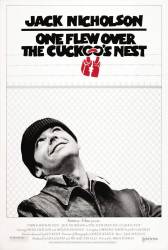Trivia: In the scene where Doctor Spivey is interviewing McMurphy, this whole scene is improvised. Spivey (Dr. Dean Brooks) is the ACTUAL doctor of the institute in real life, and was simply told to interview Jack Nicholson (McMurphy) as if he was a real patient. Nicholson had to improvise and get from the beginning of the scene to the end.
Trivia: The title comes from a nursery rhyme by British writer Oliver Goldsmith (1730?-1774).
Trivia: Ken Kesey, the author of the novel upon which the film was based, was originally hired to work on the screenplay but was fired soon thereafter.
Trivia: In order to produce the film, Michael Douglas decided to quit "The Streets of San Francisco" in 1975. The decision would eventually earn Douglas the Academy Award for Best Picture.
Trivia: The film helped trigger the de-institutionalization movement in mental health care (i.e. "mainstreaming" patients into society through community-based, outpatient treatment, rather than imprisoning them in state mental hospitals) beginning in the 1970's.
Trivia: Ken Kesey never saw the movie. He was furious over changes the producers made to his novel, particularly reducing the Chief (the book's narrator) to a minor role. He also wanted Gene Hackman to play McMurphy.
Trivia: The music at the begining and end of the film is in fact someone playing the musical saw.
Trivia: Writer Ken Kesey wrote "Cuckoo's Nest" while under the influence of LSD.
Trivia: In mental-health circles, "Cuckoo's Nest" is known simply as "The Movie."
Trivia: If you look closely at the people standing on the quay when the Hyak returns to the harbor, one of the by-standers is Jack Nicholson's long-time partner, Angelica Huston.
Trivia: Kirk Douglas played McMurphy in the stage version of the novel. His son Michael would later produce the movie.
Trivia: To further immerse the actors in their environment, director Milos Forman led them in unscripted group therapy sessions in which he directed the actors to develop their characters' mental illnesses organically. He would often capture footage of the actors, both in and out of character, without telling them that the cameras were rolling. The film's final cut includes a shot of a visibly irritated Fletcher reacting to a piece of direction fed to her by Forman.
Trivia: All of the actors who portrayed patients in the film actually lived on-site in the the Oregon State Hospital psychiatric ward during the production. The men personalized their sleeping quarters, interacted with real psychiatric patients and, as actor Vincent Schiavelli put it, spent part of their days getting a sense of what it was to be hospitalized.
Trivia: Louise Fletcher won the Academy Award for Best Actress for her role as Nurse Ratched, even though she only has 22 minutes of screen time. This was the only Academy Award Fletcher won in her acting career.






Answer: It's better explained in the novel, where the Chief is the narrator. Essentially, he played deaf and dumb, so he'd be left alone by the Nurse and the staff; seeing what they did to the other patients, he figured the less he was noticed, the better. In this way, he is privy to a lot of the seedier goings-on, since they don't think he can hear what they're saying or tell anyone what he's seen.